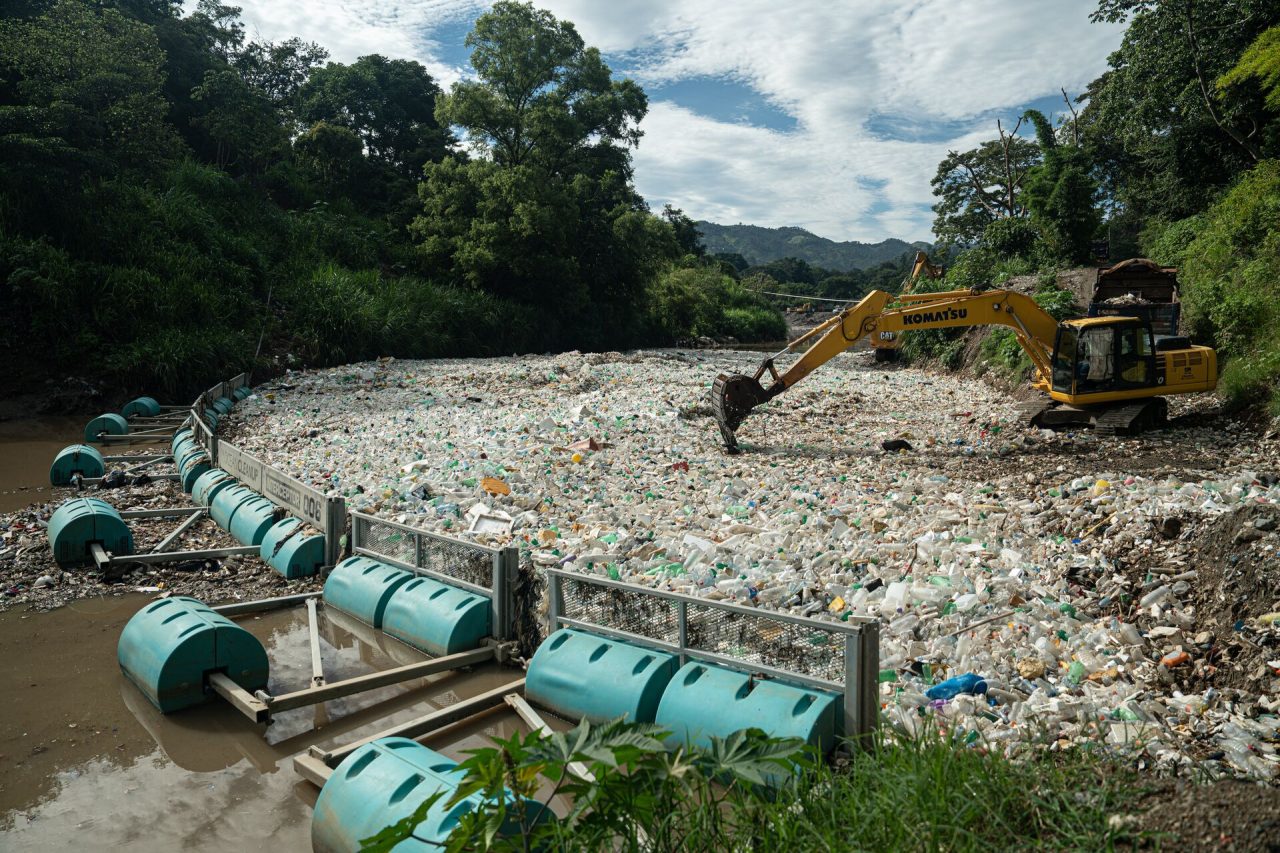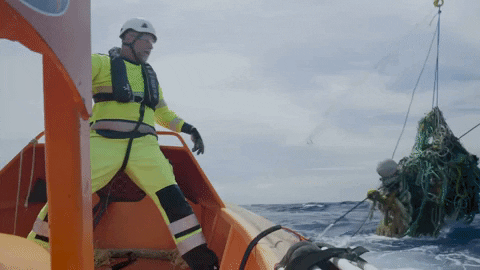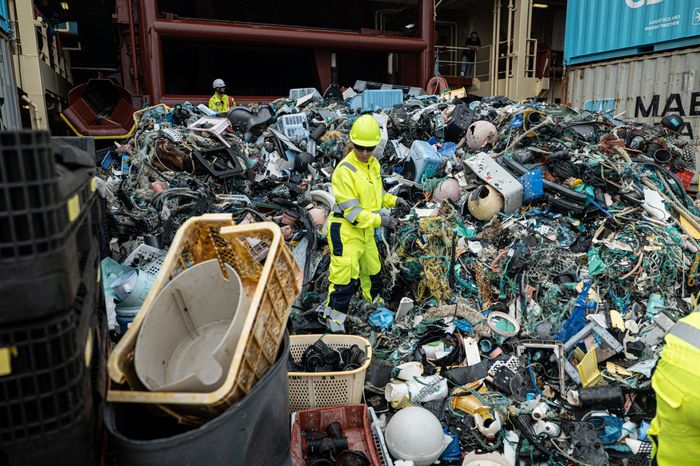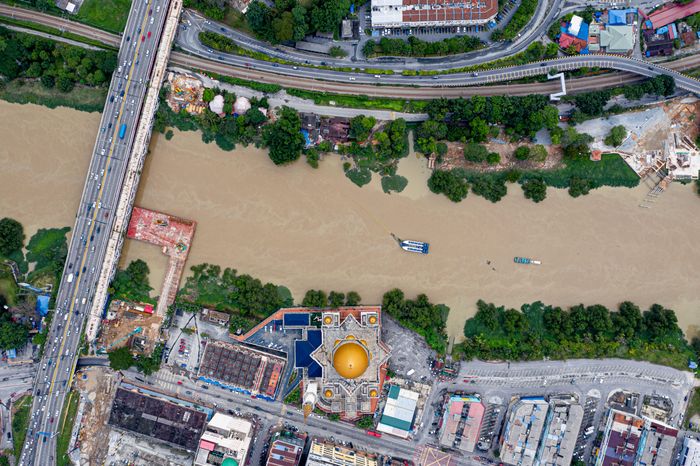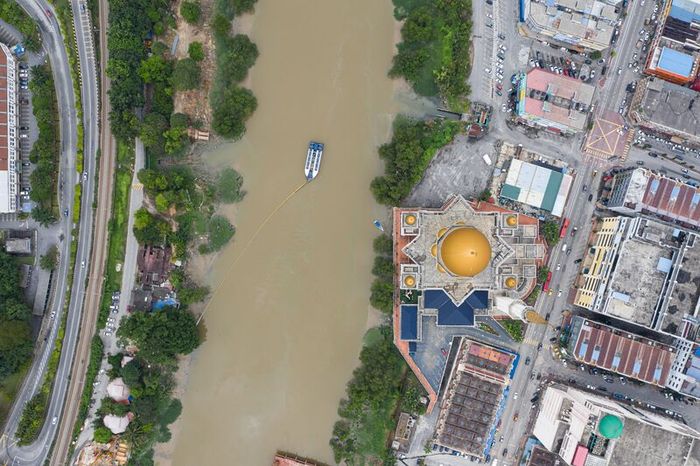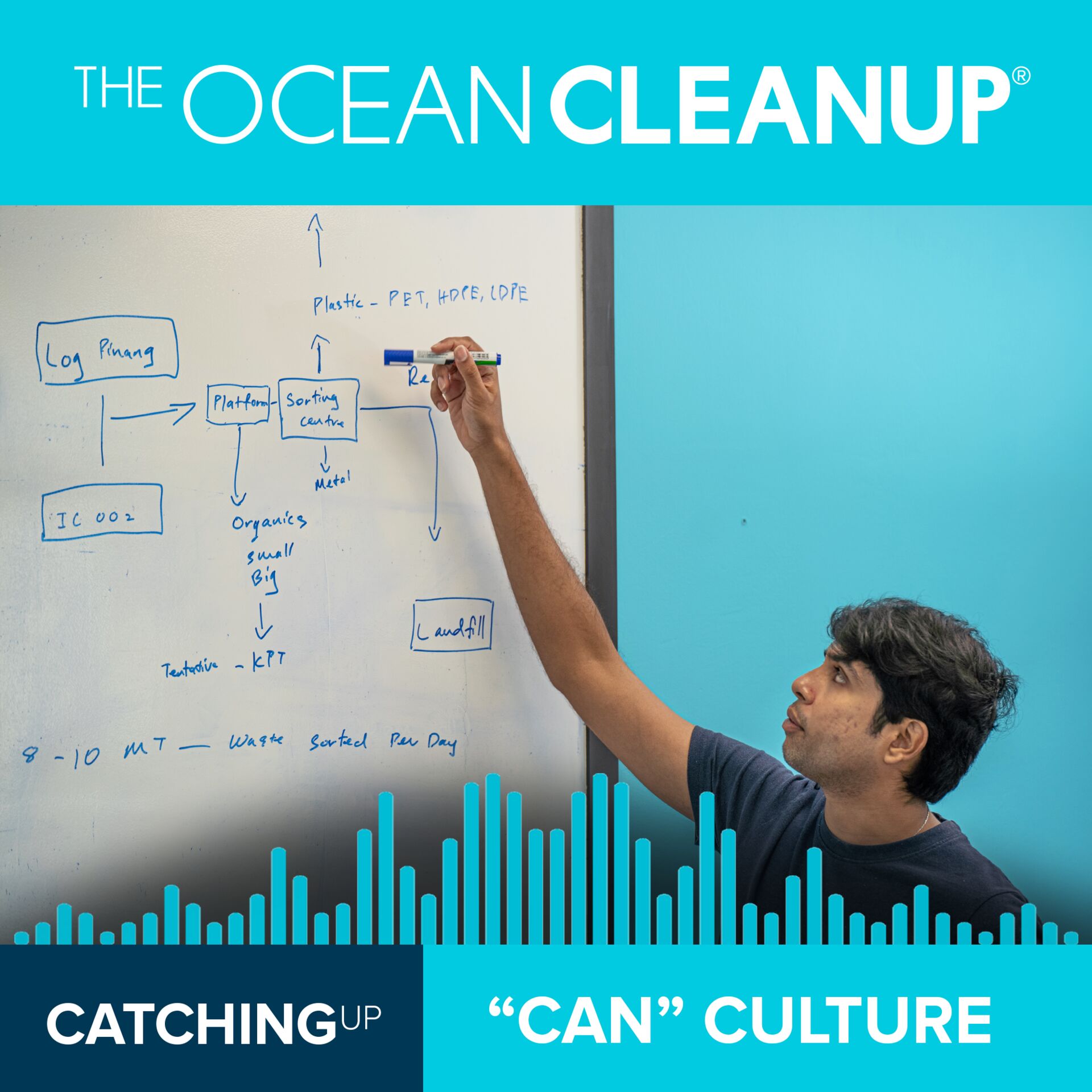
Rivers, Waste Management
“Can” Culture | The importance of being in the region
This month, we sit down with Tarkessh Mahendran, our Waste Manager in Malaysia, to discuss the vibe in our Kuala Lumpur regional office and the importance of having a team on the ground, physically located in Southeast Asia. Tarkessh speaks about cultural differences between working in Malaysia and Rotterdam, such as the subtler communication styles in Asia compared to more direct approaches in Europe.
He also gives an update on the new sorting center being built on the Klang River to improve plastic recycling, and what this will mean for the future of our Interceptor projects on the Klang.
Transcript
Disclaimer
The transcript has been edited for easier reading, excluding filler words and repetitions, adapting grammar and sentence structure.
Introduction
Dan: Welcome to Catching Up. We are sitting here in Rotterdam, and I am joined by somebody who’s made his way all the way from our Kuala Lumpur hub, so to call it. A lot of people don’t know that we actually have this over there in KL, in Malaysia, that we actually have a big presence there because of all of the projects that we have going on in Asia. So let’s just jump right into it. Introduce yourself. Give me your name. Tell me what you do at The Ocean Cleanup, and what brings you over here this week.
Tarkessh: My name is Tarkessh. I’m from a department called Catch Management. In Catch Management, we work towards understanding the different waste management practices in different countries before we deploy projects. We also ensure that we monitor how the catch is responsibly disposed of or handled accordingly.
The other side of what my department does, which is pretty exciting, is that we look into how we can upcycle and valorize these plastics. It’s not an easy thing to do. There’s a lot of research that takes place. So overall, my department will then complement the other teams in terms of ensuring that all our waste that is intercepted from these rivers or even the oceans is then put in a safer place so it will never go back into the environment.
Dan: Great. What is it like? What’s the vibe like in the office in Kuala Lumpur? I mean, you’ve spent some time here now and you’ve picked up on how things are in Rotterdam, but also the sort of energy that is around this building with everybody that’s into this project. What’s it like over there?
Tarkessh: It’s good to say that the vibe is also pretty good there. I think we are a very close knit group of people with different roles. We’ve got one person from analysis and performance. We’ve got another from Legal. We’ve got another from Funding and Partnerships, from Project Management. So, each of us represents our departments, and we work really cohesively in terms of running our projects. It’s also nice because we started off not knowing each other. And today, I think we are all really close, and we are good friends now. So it’s been a really nice journey. It’s been exciting, and I’m really hoping to develop not only in terms of interpersonal relationships with the KL team but also with the Rotterdam team. I’ve been really lucky to be part of this.
Dan: It brings me to my next question. What is it like coming to Rotterdam? How do you feel the energy over here?
Tarkessh: The energy and the vibe here are also pretty good. I think everyone is very driven. Everyone has a singular goal, which is that we want to make this world a better place. It helps that the entire leadership team, the heads of departments, everyone is very focused. And it’s nice to come here and spend time with all of them, considering we are a pretty flat organization. It’s easy to discuss ideas, to share knowledge, and to convey concerns. It’s the culture, and I think The Ocean Cleanup has a fantastic culture, working culture.
Dan: When you guys are sitting there in Kuala Lumpur, and you’re having the equivalent of an All Hands meeting, where everybody from all the departments gets together, and you all discussing all the projects that are happening over there. We talked a little bit about the vibe, but I’m curious: What is the challenge like? What challenges do you all see or deal with on a daily basis that maybe we aren’t aware of over here?
Tarkessh: I think that this was one of the things that we had a very good conversation with the river leadership team about the gaps in communication. I do think that has been addressed, and it will continue to be addressed as we move forward. Because we are so far from each other, sometimes communication might land differently. But, we’ve solved that. In terms of other challenges, besides project challenges, I think that our teams and our line managers have been really good in terms of trying to mitigate whatever challenges that we have. And that is why I’m quite happy because we have a pretty flat organization that listens to us whenever anything comes up.
The importance of boots on the ground
Dan: The thing that’s interesting for me is I spent a lot of time in Klang, in Kuala Lumpur back in 2019 when we when we launched Interceptor 002. I remember what it was like being over there at that time just for The Ocean Cleanup in general as a newborn organization almost, because it hadn’t been around very long. We were just getting ready to announce the river project, all we were doing was the ocean system at that time. To see how it’s changed! I would have never thought back in those days at Destiny Shipyard watching this spaceship get assembled that there would one day be an office just right down the street from where we deployed Interceptor 002 and Interceptor 005, but I’ve often realized how important that is. On your side, you and your team, when you’re over there, how important is it, even down to the simplicity of time zones, that you guys are in the region for so many different projects happening?
Tarkessh: Time zone is one thing. I think it’s important that we continue the cohesion between Rotterdam and the KL office. Decisions will always be streamlined and made collectively. But in terms of execution of those decisions, we can definitely deploy and execute decisions made, together with Rotterdam, very fast.
I think that is the advantage of having a KL hub, because considering our projects around, not only in Malaysia, but in Vietnam, Thailand, and Indonesia. If there are any crises or there is any need to solve any problems or if there is some importance that we need to be there immediately, any one of us can be deployed there to solve the problem if there is one. River cleaning comes with a lot of challenges and it’s good that we are there. The other thing is also the Asian context. So we bring that voice to the table as well, which I think is really good. It helps us as an organization better prepare for decisions or better prepare in terms of how we deploy projects in the future.
Dan: What people don’t realize is that culture is such a huge thing in these projects. I remember me coming over there as the loud American, and I’m doing what I’m used to doing, and realizing numerous times that, oh yeah, it’s a bit different. This is handled differently. Give me an example from your experience that you might think of that is different over there as opposed to what would be in Europe or the US.
Tarkessh: I’ll give you a very simple example. I think the European way of doing things is that you say things pretty direct. I think in the Asian context, subtlety works a lot more in the way you talk and tell. If there’s a problem, you wouldn’t want to say, hey, this is the problem, you better fix it. In Asia, it’ll be more of slow negotiations, and telling or leading the way in terms of “this should be the way how we could do it, and maybe we could try and solve it together”. And they’ll be like, yeah, okay, let’s work on it that way instead. But if you go straight on gung ho with them, they’re gonna be a bit offended. It really depends on the region, but that’s the general consensus.
The meaning of "can"
Dan: The team I was over there with, I’d be filming some of the conversations, and there would be questions coming from Europe. They’d say, hey, can we do this or how about this? And it was always just a simple “can”. What does “can” mean?
Tarkessh: Can means, yeah, we can do it, but I’m not sure. I need to check. So that’s the other thing, sometimes maybe I don’t know. Maybe they might not know how to have these conversations, whether is it with Europeans or Americans. I do it too. I’ll be like, yeah. I can.
Dan: Can.
Tarkessh: Can. We can. But there’s certain amount of doubt in that can. Right?
Dan: It’s such a nice way to answer something because it’s not a blunt ‘no’. It’s like, give me some time to think about it or let’s try it out; there’s not just a direct ‘no.’ I think that was really, really cool. So give me a bit of background on yourself. Where did you grow up and how did you end up working for The Ocean Cleanup?
Tarkessh: I was born in Kuala Lumpur in Malaysia. I grew up there. I studied for a bit in England, and then I came back. I joined a recycling and disposal company doing a lot of demolition works in the oil and gas sector. I think it was a year back when I tried to apply for The Ocean Cleanup, but there were no positions available. I was actually snorkeling on one of the islands in Indonesia a few months before I applied for The Ocean Cleanup. This was a remote island, and there were a few turtles there and we were snorkeling, and I realized there were plastic bags there. It was such a beautiful island. The guide that was taking us had secretly brought a family of seahorses to breed them because they were going extinct. And those seahorses had grown into 20 families. So it was doing quite a lot of good things there, but there was plastic there. I was trying to take the plastic and put it in my pocket while I was snorkeling, but that didn’t work. I thought, this is so bad, and I should do something more. Right? It was a coincidence that I saw an opening, and I applied for it. I went through 4 stages of interviews, and, voila. I’m here.
The Klang
Dan: And how do you see it now? I’m sure you’ve spent some time on the Klang River.
Tarkessh: Yeah.
Dan: That river is a beast and not only just the flow and the logistics of the river, but the amounts of plastic and trash that you see and everything else that you see coming back and forth on that river. So, before you were working for The Ocean Cleanup, did you have any understanding of how bad a river like that was even though it was so close to you?
Tarkessh: I think the biggest misunderstanding that I had was I always thought that ocean plastics were dirtier than river plastics. When I saw the river plastics, I thought, my god. This is so bad. What’s so worrying to me is that I was part of the Analysis and Performance team, and we did a waste analysis 3 weeks ago, and the amount of Styrofoam plastics that are in the river and those are the easiest to degrade. They break up very fast, and it’s such unnecessary plastic to use because while they can be used for a really sturdy icebox, I’m pretty sure that these plastics came from night markets or morning markets. I’m quite sure of that. It’s quite disheartening.
The problem itself is that the river is huge, it’s 120 kilometers. You’ve got a lot of tributaries coming in. It’s going through multiple industrial areas. It’s going through residential areas, through the city. It’s a huge problem to solve, but I think, we are on track. I do see that the state government and the federal government are really working towards trying to solve the problem, not just for Klang but for the whole country. And you can see this across the region. The ASEAN countries are stepping up. It always starts with the government formulating policies, and then that trickles down to execution for businesses to take up, for government agencies to take up. But the policy and framework have to be there first, and that’s what I see happening across Southeast Asia. So we are getting there. We just need to stick to the plans and go on with it as long as possible.
What happens with the plastic?
Dan: What about on the catch side? What progress are you guys making? The $1,000,000,000 question that gets tossed around all the time is what do you all do with the plastic? What are the plans over there? What are you working on?
Tarkessh: So, we are actually building a sorting center for our catch. This would be one of the first, I guess, in the region for a sorting center to be built for river plastics. It’s a very interesting pilot project, and what we want to do is we want to test and see how well we can segregate these plastics, how well we can recycle them or upcycle them, and what our options are here. There’s going to be a lot of lessons to be learned from this. And based on these lessons, then we can replicate this across the region, perhaps even replicate it across other countries when the time comes.
We also had the option to send plastics that cannot be recycled for recovery. That would mean sending them to a waste-to-energy plant. So we have these options available to us, but at the moment, we are sending our plastics to a level 5 landfill, which is highly responsible. They follow all the standards. In fact, that landfill is one of the best in Southeast Asia. So, what we have done is, at the moment, responsibly dispose of the plastics. But once the sorting center is up and running, we want to look at all these options.
Dan: That’s a great thing to talk about because in my time here at The Ocean Cleanup, there have been times when people ask us what we do with the plastic. And when we mention that it goes to a landfill, it gets a double take as if we’re doing something wrong by taking it to a landfill. But a landfill is an answer as well. It’s not the ocean. So as you said, we are responsibly taking it to one of the best landfills. That’s not a negative thing. Right?
Tarkessh: No. It’s not a negative thing, especially for plastics that have no future anymore. But of course, looking at the entire waste hierarchy, we want to minimize the amount of waste that is going into landfills. And perhaps that’s the one of the very important reasons why we are building a sorting center. We want to create as much value as possible for the waste that we are catching from the river.
Dan: Excellent. When you look around, when you look at the map of where we’ve deployed interceptors, and you think of other countries outside of Southeast Asia, like Guatemala or even the US, what do you look for? What are some of the things that you’re most interested in that you can take knowledge and take it into the projects happening over there?
Tarkessh: Quite a bit. One of the things I really like about the LATAM projects in South America is the interception technology. I think the barriers that we’ve come up with are really good. So one of the things that I would like to see more of is that we deploy these low-tech solutions as well.
These low-tech solutions can be used especially in smaller tributaries and rivers where we could intercept cleaner plastics before they enter rivers such as the Klang River, where they are moving up and down, up and down, up and down, and degrading along the way. It makes it harder to clean and recycle. So yeah. I do like the solutions in LATAM as well.
The Interceptor Original
Dan: In a place like Klang and in a lot of places where we have “the spaceship” as I like to call it, there’s still a value to that thing. Right? I mean, that thing turns eyeballs. The kids love it, and people stare at it and take pictures and selfies.
Tarkessh: Yeah. I mean, that was what I associated The Ocean Cleanup with before this. Of course, I’ve been following The Ocean Cleanup for quite a number of years, but there’s such a pull factor with the Interceptor. The Interceptor creates awareness because then it creates curiosity. What is that thing doing there in the river? Why is that in the river? This question has got a lot of explanations and answers, and then they start to see the bigger picture: Why are we in those rivers, why are we in the ocean? It has a lot of added value.
Dan: Yeah, and it’s something that we push a lot here, and I see it everywhere that I go. There’s always kids watching this thing. I’ve seen kids on that bridge for 2 hours standing on that bridge staring at this thing. This is something that we want to get into a bit more in the future, the educational side of things. How do you think that’s different in a place like Asia as opposed to, Europe or South America or wherever? Or is it all the same? It’s just important.
Tarkessh: I think when it comes to kids, it’s all the same, and we should teach them young. They should learn from a young age. I am very sure that if we go to any of the schools or universities or colleges and we say, hey, The Ocean Cleanup is coming, they would be elated and excited to meet everybody who’s involved. They would have so many questions. I’ve gone to events where people introduced me. Hey, do you know that he works for The Ocean Cleanup? And they’ll be like, “Oh my god. You work for The Ocean Cleanup?” And then they bring their kids and introduce me to their kids and say, do you wanna have a conversation with him about what you’re doing and how you are helping the environment? So cool. Right? I think it’s the same everywhere.
I think globally, everybody has a lot of respect for us. They value what we’re doing, and I think we should always continue to do what we’ve been doing because the impact is huge. And I think for an organization like The Ocean Cleanup, we, I do believe, have a very big say in terms of how we could contribute to the Asian context. They look up to us. They admire what we do. They admire what we want to do. The issues are complex. Even on a local level, it’s complex. But there are always going to be issues no matter what. The challenges will always exist. It’s just that we need to find common ground and work on them.
Life in KL
Dan: So when you’re not working for The Ocean Cleanup, and you’re in Kuala Lumpur, what are you doing? What’s a day in the life like on a weekend or away from the office for you over there?
Tarkessh: If I’m not working, I spend time with friends and family. My dog takes up a lot of my time as well. It’s normally just that. I do meet up with my friends quite often when I’m not working because I don’t get to see them very often. Sundays is normally family day. It’s something that we started when my grandma was around, and we’ve been continuing it. But these days it’s just the boys, the uncles, my dad, and my brother and stuff. So that’s normally what we do. Sometimes, I try to make time for holidays, but it depends.
Dan: Snorkeling.
Tarkessh: That was actually my first time snorkeling, and I saw those plastics.
Dan: So what excites you? What excites you for the future? What’s coming up? There’s this sorting center. There’s a lot happening with the Malaysia projects, not to mention all the other Asia projects, not to mention everything else that’s happening around here. But what excites you personally for the future with your career at The Ocean Cleanup?
Tarkessh: What excites me is that someday, I hope the river’s success stories will be on par with the ocean’s success stories. Of course, I know the oceans started earlier. They’re more structured. They’ve got a lot of things, in place, but it took them really long. I mean, the river teams are really young. We’ve got so much to learn. All of us are doing this for the first time. I do hope in the future, we will be intercepting a lot more plastics. We will be finding value for it. I do hope that The Ocean Cleanup will be one of the first in the world to actually show that, hey, we turn what is nonvaluable into highly valuable. So these are the things that really excite me, and I’m very invested in the organization. I do trust that we have all the right people in place to make this a success. That’s for sure.
Dan: And you’re one of them, man. Tarkessh, thank you so much for visiting, coming here, sitting down, and catching up with me. It was a pleasure getting to know you and the rest of your team. It was so cool. I wish you all were around back in 2019. It would have been so nice then, but I’m so glad that you all exist over there. And to everybody that’s listening, thank you. Keep supporting us. See what what’s going on over in Southeast Asia that this incredible team is taking on. And we’ll keep doing what we’re doing. You just keep supporting us, and we’ll see you next month.
